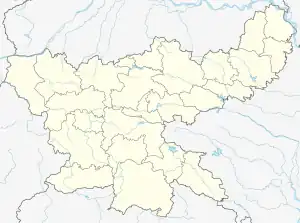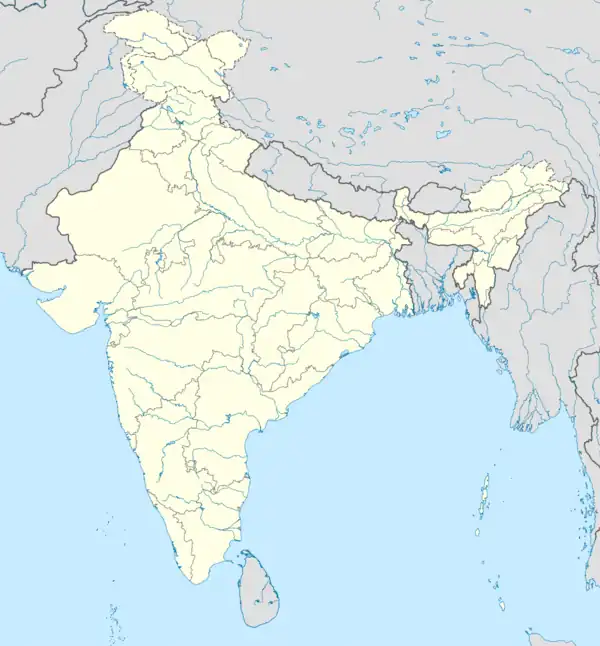Mango (Jamshedpur)
Mango is a city and a neighbourhood of Jamshedpur city. It is situated across the Subarnarekha River and is connected to Jamshedpur via three bridges laid side by side. It is a huge and growing residential area. Once a less populated little town in the Dhalbhum subdivision of the East Singhbhum district , it is now a booming neighbourhood and real estate hotbed.
Mango | |
|---|---|
City and neighborhood | |
 Mango Location in Jharkhand, India  Mango Mango (India) | |
| Coordinates: 22°49′39″N 86°12′59″E | |
| Country | |
| State | Jharkhand |
| District | East Singhbhum |
| Population (2011) | |
| • Total | 223,805 |
| Languages* | |
| • Official | Hindi, Urdu |
| Time zone | UTC+5:30 (IST) |
| PIN | 831012, 831018, 832110 |
| Vehicle registration | JH |
Mango has the status of a 'city' according to the government through being part of the main city Jamshedpur. It is a notified area and is run by its own notified area committee, namely, Mango Notified Area Committee (MNAC). The electricity services are provided by the state-run electricity board, JBVNL(Jharkhand Bijli Vitran Nigam Limited).
Despite witnessing a drastic rise in infrastructure and housing projects, this area has been plagued with one of the highest crime rates in the city of Jamshedpur. Termed "the crime hub of Jamshedpur" by local news websites and journalists, this area has witnessed a significant rise in crime rates since the early noughties, Blocks like Ulidih, Azadnagar and Shankusai (Sankosai) being the centres of violent crimes including thefts, shootings and stabbings.
Geography
Location
Mango is located at 22°49′39″N 86°12′59″E.
Jamshedpur Urban Agglomeration
With its recognition as an industrial town as early as the 1911 census, Jamshedpur was set on the road of steady population growth, as large number of emigrants flocked in for work opportunities. While in the earlier decades the central nucleus grew, in the later decades towns around Jamshedpur grew rapidly. In 2011, Jamshedpur Urban Agglomeration included 13 urban centres, with a total population of 1.3 million people. However, in more recent years, Jamshedpur UA “has lacked the growth and development observed around other similar industrial towns in western and southern India.”[1]
Note: The map alongside presents the Jamshedpur Urban Agglomeration. All places marked in the map are linked in the larger full screen map.
Civic administration
There is a police station at Mango.[2]
Demographics
According to the 2011 Census of India, Mango had a total population of 223,805, of which 115,970 (52%) were males and 107,835 (48%) were females. Population in the age range 0–6 years was 29,338. The total number of literate persons in Mango was 166,870 (85.81% of the population over 6 years).[3]
(*For language details see Golmuri-cum-Jugsalai block#Language and religion)
Jamshedpur Urban Agglomeration includes: Jamshedpur (Industrial Town), Jamshedpur (NAC), Tata Nagar Railway Colony (OG), Mango (NAC), Jugsalai (M), Bagbera (CT), Chhota Gobindpur (CT), Haludbani (CT), Sarjamda (CT), Gadhra (CT), Ghorabandha (CT), Purihasa (CT), Adityapur (M Corp.), Chota Gamahria (CT) and Kapali (CT).[4]
As of 2001 India census,[5] Mango had a population of 166,091. Males constitute 53% of the population and females 47%. Mango has an average literacy rate of 70%, higher than the national average of 59.5%: male literacy is 76%, and female literacy is 63%. In Mango, 14% of the population is under 6 years of age.
Economy
Mango's economy is mostly based on real estate and it is the largest hotspot for this sector. Apart from that Mango's economy is mostly based on motor parts manufacturing, selling & repairs and transportation. However, in recent years the area has also became a destination of information technology (IT) and business processing outsource (BPO). Aegis have a campus in Maango which employees around 2000 peoples.
Mango also have industries like Jharkhand State Beverages Corp., Triveni Earthmovers[6] etc.
Education
- Al Kabir Polytechnic
- Netaji Subhas University
- Awadh Dental College & Hospital[7]
- Mahatma Gandhi Memorial Medical College & Hospital
- Karim City College (Mango Campus)
- Jamshedpur Worker's College
- J.K.S College
- Maryland Institute Of Technology & Management[8]
- RVS College of Engineering & Technology
- Grace Bible College
- Kabir Memorial Urdu high school
Transport
Many buses and auto-rickshaws operate from Sakchi, Jamshedpur to Mango on a regular basis. Tatanagar Junction railway station is the nearest railway station at a distance of 12 km.
See also
References
- "Growth of Industrial Cities in India: A Case Study of Jamshedpur" (PDF). Amaresh Dubey. The Third Conference: GIS-based Global History from Asian Perspectives, 5 June 2015. Retrieved 25 December 2021.
- "District Police Profile – East Singhbhum". Jharkhand Police. Retrieved 30 December 2021.
- "District Census Handbook, Purbi Singhbhum, Series 21, Part XII B" (PDF). Location code: 801780, Pages 334-335: District primary census abstract, 2011 census. Directorate of Census Operations Jharkhand. Retrieved 15 December 2021.
- "Constituents of Urban Agglomerations Having Population 1 Lakh & above" (PDF). Provisional Population Totals, Census of India 2011. Retrieved 15 December 2021.
- "Census of India 2001: Data from the 2001 Census, including cities, villages and towns (Provisional)". Census Commission of India. Archived from the original on 16 June 2004. Retrieved 1 November 2008.
- "Three more MoUs inked on concluding day of Jharkhand mining show". Avenue Mail. 2 November 2017. Retrieved 15 April 2020.
- "Awadh Dental College & Hospital". awadhdentalcollege.com. Retrieved 15 April 2020.
- "Maryland Institute of Technology & Management". mditm.com. Retrieved 15 April 2020.